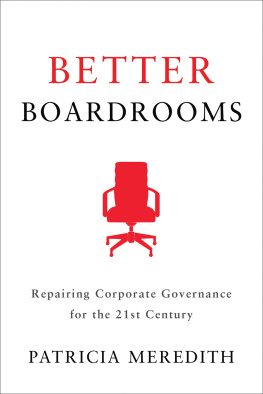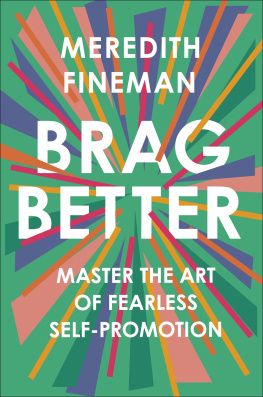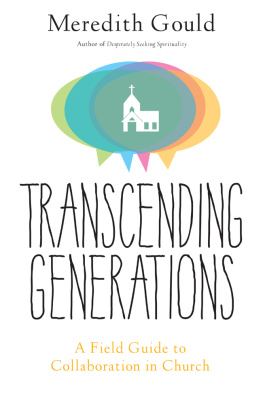Patricia Meredith - Better Boardrooms
Here you can read online Patricia Meredith - Better Boardrooms full text of the book (entire story) in english for free. Download pdf and epub, get meaning, cover and reviews about this ebook. publisher: University of Toronto Press, genre: Business. Description of the work, (preface) as well as reviews are available. Best literature library LitArk.com created for fans of good reading and offers a wide selection of genres:
Romance novel
Science fiction
Adventure
Detective
Science
History
Home and family
Prose
Art
Politics
Computer
Non-fiction
Religion
Business
Children
Humor
Choose a favorite category and find really read worthwhile books. Enjoy immersion in the world of imagination, feel the emotions of the characters or learn something new for yourself, make an fascinating discovery.
- Book:Better Boardrooms
- Author:
- Publisher:University of Toronto Press
- Genre:
- Rating:3 / 5
- Favourites:Add to favourites
- Your mark:
- 60
- 1
- 2
- 3
- 4
- 5
Better Boardrooms: summary, description and annotation
We offer to read an annotation, description, summary or preface (depends on what the author of the book "Better Boardrooms" wrote himself). If you haven't found the necessary information about the book — write in the comments, we will try to find it.
Better Boardrooms — read online for free the complete book (whole text) full work
Below is the text of the book, divided by pages. System saving the place of the last page read, allows you to conveniently read the book "Better Boardrooms" online for free, without having to search again every time where you left off. Put a bookmark, and you can go to the page where you finished reading at any time.
Font size:
Interval:
Bookmark:

ALSO BY PATRICIA MEREDITH
Catalytic Governance: Leading Change in the Information Age, by Patricia Meredith, Steven A. Rosell, and Ged R. Davis (Rotman-UTP Publishing, an imprint of University of Toronto Press, 2016)
Stumbling Giants: Transforming Canadas Banks for the Information Age, by Patricia Meredith and James L. Darroch (Rotman-UTP Publishing, an imprint of University of Toronto Press, 2017)

Repairing Corporate Governance for the 21st Century
PATRICIA MEREDITH
UNIVERSITY OF TORONTO PRESS
Toronto Buffalo London
Rotman-UTP Publishing
An imprint of University of Toronto Press
Toronto Buffalo London
utorontopress.com
Patricia Meredith 2020
All rights reserved. No part of this publication may be reproduced, stored in or introduced into a retrieval system, or transmitted in any form or by any means (electronic, mechanical, photocopying, recording, or otherwise) without the prior written permission of both the copyright owner and the above publisher of this book.
Library and Archives Canada Cataloguing in Publication
Title: Better boardrooms : repairing corporate governance for the
21st century / Patricia Meredith.
Names: Meredith, Patricia, 1955, author.
Description: Includes bibliographical references and index.
Identifiers: Canadiana (print) 20200307363 | Canadiana (ebook) 20200307460 |
ISBN 9781442649750 (hardcover) | ISBN 9781442621381 (EPUB) |
ISBN 9781442621374 (PDF)
Subjects: LCSH: Corporate governance Canada. | LCSH: Bank directors
Canada. | LCSH: Banks and banking Canada.
Classification: LCC HG1616.D5 M47 2020 | DDC 332.1068/40971 dc23
ISBN 978-1-4426-4975-0 (cloth) ISBN 978-1-4426-2138-1 (EPUB)
ISBN 978-1-4426-2137-4 (PDF)
Printed in Canada
We acknowledge the financial support of the Government of Canada, the Canada Council for the Arts, and the Ontario Arts Council, an agency of the Government of Ontario, for our publishing activities.

This book is dedicated to four men who have helped me identify and interpret disruptive change; apply strategy and governance in a rapidly changing environment; make sense of what I observed in the corporate arena; and understand the implications for governance in the information age.
James Williams, founder and president, Williams Inference Global (died in 2010)
Allan L. (Al) Flood, former chairman and chief executive officer, Canadian Imperial Bank of Commerce
Michael C. Jensen, Jesse Isidor Straus professor of business administration, Harvard Business School
Steven A. Rosell, president, Viewpoint Learning (died in 2018)
This is the third book in a trilogy. The first volume, Catalytic Governance: Leading Change in the Information Age, co-authored with Steven Rosell and Ged Davis, set out a process for leading transformative change. It was based on our experience with the Canadian Task Force for the Payments System Review. The second book, Stumbling Giants: Transforming Canadas Banks for the Information Age, co-authored with James Darroch, examined how poorly positioned the Canadian banks are to withstand the social and technological tsunami sweeping over financial services. That book was primarily aimed at the enthusiastic young bankers who realize that their industry must change if it is to regain its reputation as a vibrant enabler of economic growth. But, as James and I made clear, the dreams of these men and women will not be realized unless a broad cross-section of Canadians policy makers and regulators, customers, suppliers, investors, and, not least, the bankers themselves work together to create a banking system better suited to the twenty-first century.
This, my third book, covers a much bigger and more pressing challenge: the need for a new system of corporate governance that takes account of the fast-changing business environment. The shortcomings of our present governance system have been on my mind ever since I became head of corporate strategy at Canadian Imperial Bank of Commerce, in 1993. I thought I had come up with some answers ten years ago, when I wrote my PhD dissertation on the impact of disruptive change on the residential mortgage industry, but my ideas turned out to be based more on hope than on reality. My view was that companies did not respond to disruptive change because they failed to see the longer-term implications of what was going on around them, and because conflicts of interest and inertia got in the way of real change. In a nutshell, as a former Canadian bank CEO said to me after a friendly discussion about trends in the financial services industry, It isnt going to happen on my watch, and I am not going to do anything about it. It became clear to me that if the chief executive would not do anything to fix a broken system, neither would anyone else, including the board of directors.
I have been working on strategy, uncertainty, and governance for twenty-five years, yet I am only now starting to fully grasp the challenges of managing strategic risk in the information age. Much of my initial thinking was based on my experience with public, private, and not-for-profit boards. But the traditional approach has failed dismally, as most incumbents struggle to compete effectively against upstart rivals in an entirely new environment the information age, marked by a seismic shift from traditional industries spawned by the Industrial Revolution to an economy based on data. The information-age model is based on a commodity that is quickly and widely disseminated using computing and communications technology. Its hallmarks are high up-front investments in intangibles and very low reproduction costs, the inverse of the industrial age. As a result, the information economy requires entirely new governance processes that prioritize timely engagement, dialogue, and learning, rather than expert meetings long after the opportunity has presented itself.
At first, I thought that companies could avoid the tremendous loss of financial and human resources that takes place when they fail to adapt if only their boards of directors paid more attention to changes in the external environment, and then focused on turning those challenges into opportunities. Sadly, Ive discovered that the conflicts of interest that confront corporate managers have also infiltrated the boardroom. The fact is that very few late-career executives or directors are brave enough to initiate transformative change. They would much prefer their company just to tread water until they retire, and to dump the problem in their successors laps.
Four men have awakened me to the failure of existing governance structures to recognize and respond to the changes that are buffeting business, especially in North America and Britain.
I was fortunate to meet Jim Williams of Williams Inference Global in 1994. For more than forty years, Jim scanned newspapers and periodicals, finding investment ideas in hidden and unintended messages. He picked up the technique from Connecticuts Carniglia brothers: Ettore, a physician, and Francis, a veterinarian. From them he learned the fundamentals of sound diagnosis: keep an open mind, observe carefully, and let conclusions emerge. Jims approach was to find anomalies, which according to American physicist, historian, and philosopher Thomas Kuhn, is the first step in recognizing a scientific revolution. Jim taught me to identify anomalies, watch if they form a pattern, and then draw inferences about their longer-term impact on a company or industry. He recognized the Internets impact on business a decade before its widespread adoption. Running through his work is the message that recognizing disruptive change early is critical to a companys long-term well-being. Failing to do so is sure to lead to disaster.
Font size:
Interval:
Bookmark:
Similar books «Better Boardrooms»
Look at similar books to Better Boardrooms. We have selected literature similar in name and meaning in the hope of providing readers with more options to find new, interesting, not yet read works.
Discussion, reviews of the book Better Boardrooms and just readers' own opinions. Leave your comments, write what you think about the work, its meaning or the main characters. Specify what exactly you liked and what you didn't like, and why you think so.













